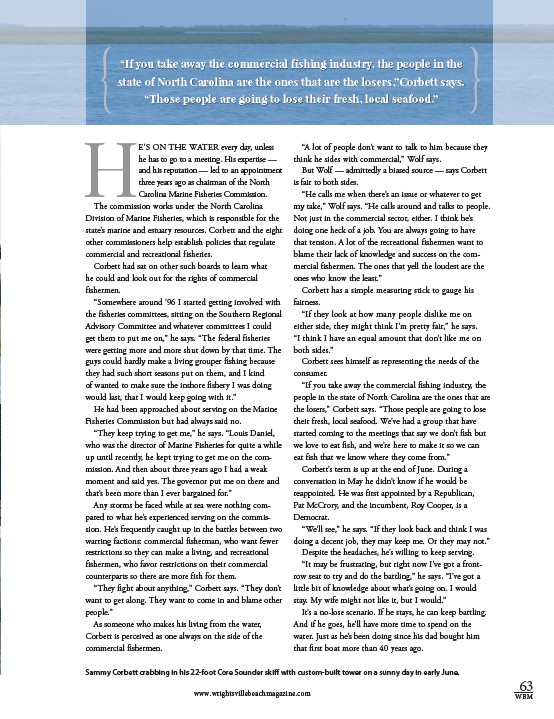
63
{ “If you take away the commercial fishing industry, the people in the
state of North Carolina are the ones that are the losers,”Corbett says.
} “Those people are going to lose their fresh, local seafood.”
HE’S ON THE WATER every day, unless
he has to go to a meeting. His expertise —
and his reputation — led to an appointment
three years ago as chairman of the North
Carolina Marine Fisheries Commission.
The commission works under the North Carolina
Division of Marine Fisheries, which is responsible for the
state’s marine and estuary resources. Corbett and the eight
other commissioners help establish policies that regulate
commercial and recreational fisheries.
Corbett had sat on other such boards to learn what
he could and look out for the rights of commercial
fishermen.
“Somewhere around ’96 I started getting involved with
the fisheries committees, sitting on the Southern Regional
Advisory Committee and whatever committees I could
get them to put me on,” he says. “The federal fisheries
were getting more and more shut down by that time. The
guys could hardly make a living grouper fishing because
they had such short seasons put on them, and I kind
of wanted to make sure the inshore fishery I was doing
would last, that I would keep going with it.”
He had been approached about serving on the Marine
Fisheries Commission but had always said no.
“They keep trying to get me,” he says. “Louis Daniel,
who was the director of Marine Fisheries for quite a while
up until recently, he kept trying to get me on the com-mission.
And then about three years ago I had a weak
moment and said yes. The governor put me on there and
that’s been more than I ever bargained for.”
Any storms he faced while at sea were nothing com-pared
to what he’s experienced serving on the commis-sion.
He’s frequently caught up in the battles between two
warring factions: commercial fisherman, who want fewer
restrictions so they can make a living, and recreational
fishermen, who favor restrictions on their commercial
counterparts so there are more fish for them.
“They fight about anything,” Corbett says. “They don’t
want to get along. They want to come in and blame other
people.”
As someone who makes his living from the water,
Corbett is perceived as one always on the side of the
commercial fishermen.
“A lot of people don’t want to talk to him because they
think he sides with commercial,” Wolf says.
But Wolf — admittedly a biased source — says Corbett
is fair to both sides.
“He calls me when there’s an issue or whatever to get
my take,” Wolf says. “He calls around and talks to people.
Not just in the commercial sector, either. I think he’s
doing one heck of a job. You are always going to have
that tension. A lot of the recreational fishermen want to
blame their lack of knowledge and success on the com-mercial
fishermen. The ones that yell the loudest are the
ones who know the least.”
Corbett has a simple measuring stick to gauge his
fairness.
“If they look at how many people dislike me on
either side, they might think I’m pretty fair,” he says.
“I think I have an equal amount that don’t like me on
both sides.”
Corbett sees himself as representing the needs of the
consumer.
“If you take away the commercial fishing industry, the
people in the state of North Carolina are the ones that are
the losers,” Corbett says. “Those people are going to lose
their fresh, local seafood. We’ve had a group that have
started coming to the meetings that say we don’t fish but
we love to eat fish, and we’re here to make it so we can
eat fish that we know where they come from.”
Corbett’s term is up at the end of June. During a
conversation in May he didn’t know if he would be
reappointed. He was first appointed by a Republican,
Pat McCrory, and the incumbent, Roy Cooper, is a
Democrat.
“We’ll see,” he says. “If they look back and think I was
doing a decent job, they may keep me. Or they may not.”
Despite the headaches, he’s willing to keep serving.
“It may be frustrating, but right now I’ve got a front-row
seat to try and do the battling,” he says. “I’ve got a
little bit of knowledge about what’s going on. I would
stay. My wife might not like it, but I would.”
It’s a no-lose scenario. If he stays, he can keep battling.
And if he goes, he’ll have more time to spend on the
water. Just as he’s been doing since his dad bought him
that first boat more than 40 years ago.
Sammy Corbett crabbing in his 22-foot Core Sounder skiff with custom-built tower on a sunny day in early June.
www.wrightsvillebeachmagazine.com WBM